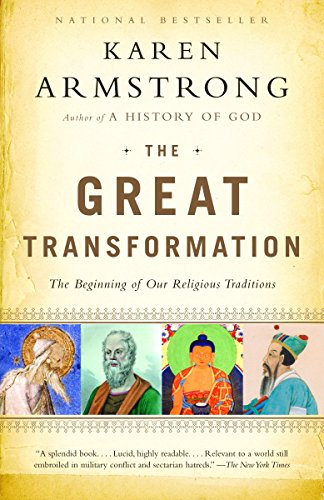I have an “ask” at the end of this post, and will appreciate any feedback.
A few months ago, I decided to read the Bible all the way through, from beginning to end. As familiar as I am with some parts of the Bible, I have never read it all the way through before and there are many parts I have likely never read.
I think we can all say that it’s pretty exciting until the middle of Exodus, then it becomes a slog for quite awhile before getting to some more interesting reading again. But what I am after in this post is the genocidal-type stuff: things like God said to slaughter them all, and God took displeasure if the Israelites didn’t obey this edict.
 The Great Transformati...
Best Price: $2.02
Buy New $9.49
(as of 12:45 UTC - Details)
The Great Transformati...
Best Price: $2.02
Buy New $9.49
(as of 12:45 UTC - Details)
I have written something on my thoughts about this before; instead of coming up with some new way to say it, I will just copy and paste:
To properly understand this book and the time, I will be walking on some difficult terrain, especially when it comes to the Israelites and aspects of the Jewish tradition beyond that which pointed to Jesus. I am not trying to understand or develop theology when I note the history: there is much of Old Testament Jewish history prior to the times of the prophets that is greatly similar to all Middle Eastern cultures of the time: wars, territories conquering and conquered, massacres, slavery, dislocation, etc., etc., etc.
Why do I point this out? The Old Testament, absent that which points to Jesus, can be a history about any of the tribes and gods in the Middle East of the time. Change the names and the victors, and it is the same story: my god is bigger than your god; god will lead us to victory in battle; god, why have you forsaken your people; god, why have you abandoned us?
In the beginning was the Word. The Word became flesh. This is unique. In the Old Testament, it is what points to this Word that is unique – unique vs. other Middle Eastern religions and unique, to my knowledge, among any of the major religions around the world. Without the Word, it is just tribes doing battle and hoping that my god is stronger than your god.
 The Great Evil: Christ...
Buy New $19.95
(as of 03:39 UTC - Details)
Jesus summarized the law with two commandments: Love the Lord your God; love your neighbor as yourself. On the surface (and maybe deeper), this is quite contrary to much of what we read in the Old Testament.
The Great Evil: Christ...
Buy New $19.95
(as of 03:39 UTC - Details)
Jesus summarized the law with two commandments: Love the Lord your God; love your neighbor as yourself. On the surface (and maybe deeper), this is quite contrary to much of what we read in the Old Testament.
I will add: while I have not yet made it to the time of the exile in my reading, from my recollection (and also from reading The Great Transformation: The Beginning of Our Religious Traditions, by Karen Armstrong), my sense is that the story changes significantly – the relationship of God to man starts moving toward what Christians see in Jesus and the Apostle Paul. Maybe I am wrong about this, but this is somewhat secondary for now.
So, why am I writing this? I am certain that the early church fathers and many since then have dealt with this question of what clearly are recounted as genocidal stories. How do these fit into an understanding of proper Christianity?
So, I ask for any references to serious apologists on this matter.
Reprinted with permission from Bionic Mosquito.




